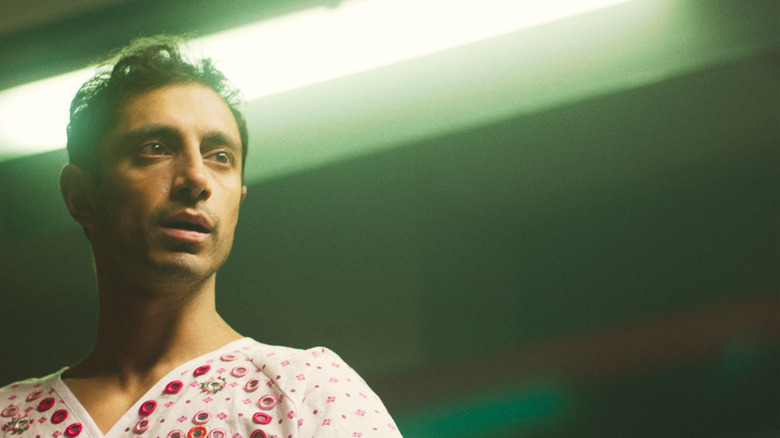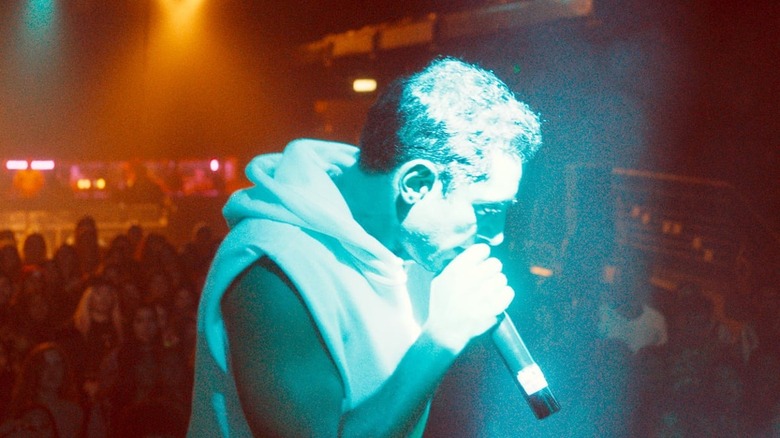Mogul Mowgli Review: A Revelatory Riz Ahmed Returns To His Roots In A Surreal Rap Drama
What appears to be a dimly lit forest canvas parts, revealing itself to be a green stage curtain — one from which Riz Ahmed emerges, swaying as if possessed by some religious delirium while words tumble out of his mouth like a prayer. This is his church, and rap is his religion.
Ahmed stars in "Mogul Mowgli," the debut narrative feature from documentary filmmaker Bassam Tariq, as Zed, a British-Pakistani rapper who is just about to get the biggest break of his moderately successful career: he's been asked to be the opening act for a popular artist's international tour. But just as he's preparing to embark on the tour, he's hit with a debilitating autoimmune disease that robs him of his ability to walk.
It sounds kind of familiar doesn't it? Ahmed (rightfully) earned accolades for his turn in "Sound of Metal," an incredible film in which the actor played ... a musician whose life changes after he's hit with a debilitating disability. But even if the role is reminiscent of Ahmed's career-best performance, "Mogul Mowgli" is more than just a retread for Ahmed, who co-wrote the film with Tariq. "Mogul Mowgli" is both an intimate character study about a young man struggling with the newfound limitations of his body, as well a deep, profound, and often tangled exploration of Ahmed and Tariq's own Pakistani roots.
"Mogul Mowgli" takes its name from a song by the Swet Shop Boys — the hip-hop group that Ahmed used to perform with under the moniker Riz MC. "The song's about being torn between different sides of your identity, being descended from moguls and rich heritage, but living as Mowgli, lost in the urban jungle far away from the village that was once home," Ahmed has explained, and "Mogul Mowgli" appears to literalize that song — painting a vision of the past and future colliding within one man's body.
Ahmed prowls, he stalks around the stage as the London-born Zed raps over the barest of musical beats about his immigrant upbringing as the small but packed audience cheers every shared experience or slight. His performance feels less like a polished musical track than spoken-word — words which continue even when Zed is not on the stage, but simply staring into space while in bed with his American girlfriend, his lyrics becoming a prayer of sorts before he drifts off to sleep. The lyrics are a poetic distillation of his turmoiled existence: part of multiple worlds but not belonging to any of them, wishing to forge ahead to create a legacy for himself, but too far separated from the cultural history that put him there. It's been months since he last saw his family, his girlfriend (Aiysha Hart) reminds him.
The Sickness of the Divide
Zed makes a brief trip to his parents' cramped London home for the first time in years, returning to unopened boxes and a mom who is convinced that he is plagued by the "evil eye." His dad Bashir (a tremendous Alyy Khan) barely knows how to talk with him. Zed is embarrassed by his father's various failed business ventures, but is even more embarrassed to learn secondhand of the hardships Bashir went through to escape the Partition of India. But a brief trip turns into a lengthy stay after a fight with a fan outside of the mosque sends Zed to the hospital with a terrifying diagnosis: he has an autoimmune disease that is quickly degenerating his muscles. Soon, he might not be able to walk without aid.
"Your body can't recognize itself. So it's attacking itself," his doctor tells him in a line of dialogue which is almost hilariously on-the-nose. But the business of exploring one's past is never subtle; it's messy, and uncertain, and confused. And Ahmed and Tariq manage to capture the ineffable strangeness of this process — Ahmed in his distraught, almost helpless performance, and Tariq in the film's surreal, dreamlike quality as the past and present bleed together.
It's no exaggeration to say that Riz Ahmed is fast becoming one of our great screen talents. Even if it's a little strange that he's returning to the "sick musician" well so quickly after "Sound of Metal," Ahmed always surprises you — whether it's in a choice to whisper rather than scream, or stay still rather than twitch and lash out.
Zed is haunted by visions of a man in a flower headdress, who sings and mocks him throughout his treatment. The man in the flower headdress was on the cover of a dusty old cassette tape for "Songs of the Partition" which Zed had discovered in the pile of his father's stored junk. He appears to Zed throughout the film — sometimes wearing a hospital gown, sometimes stark naked — chanting the phrase "Toba Tek Singh," the name of a city in Pakistan, but also something that becomes a foothold of sorts for Zed, who incorporates the words into a song he's forced to give to the other British-Pakistani rapper taking his place on the tour. But the phrase also becomes a shared language between Zed and his father — a way for them to finally connect and cross the divide between them. The man in the flower headdress, he claims to Zed in one of his visions, is himself "the sickness of the divide."
Like I said, the metaphors aren't subtle. But Tariq's stripped-back direction and Ahmed's willingness to go into messy, ambiguous territory when it comes to that classic "immigrant story" is amazing, even as Zed's visions grow increasingly ludicrous and nonsensical. "Mogul Mowgli" is an imperfect exploration of cultural identity and generational trauma, but in its messiness and chaos, it feels all the more genuine. We children of the second generation may never cross that divide ourselves, but at least we can maybe learn a path.
/Film Rating: 8 out of 10

